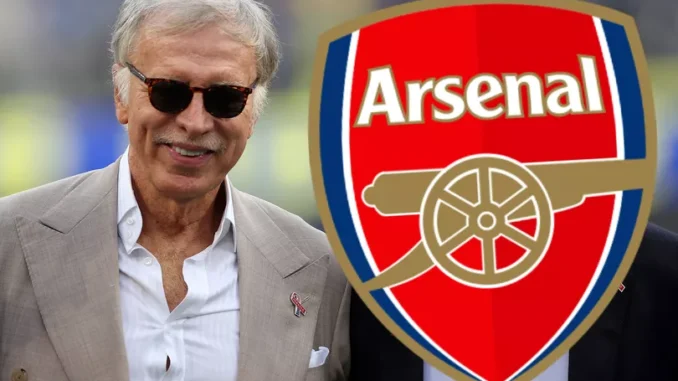
Kroenke Sports & Entertainment has seen a huge surge in the value of the sports teams that it owns
Kroenke Sports & Entertainment, the parent company that owns Arsenal, has seen a £2.3bn increase in its value compared to the previous year.
Arsenal principal owner Stan Kroenke’s KSE firm has seen significant growth over the past 12 months, with the annual Forbes report into sporting empire values placing KSE second on the list at $15.59bn (£12.3bn), a 22% bump on last year’s figures of $12.75bn (£10bn).
That valuation of the KSE empire puts them ahead of Liverpool owners Fenway Sports Group, with the John W. Henry-led firm having seen a 25% increase year-on-year to leapfrog Dallas Cowboys owner Jerry Jones into third place. Formula One and Atlanta Braves owners, Liberty Media, occupy the top spot with an $18.2bn (£14.3bn) valuation.
The significant rise for Kroenke’s firm can be attributed to continually increasing valuations of the sports teams and assets that form his KSE investment portfolio.
Alongside Arsenal, KSE holds majority stakes in the Los Angeles Rams NFL team, the Denver Nuggets NBA franchise, the Colorado Avalanche (NHL), the Colorado Rapids (MLS), the Colorado Mammoth lacrosse team, and the Altitude Sports & Entertainment regional sports network that covers Colorado’s major sports teams.
Sports team valuations have enjoyed double-digit compound annual growth rates for some time now, but at present the incline has seen valuations take off, meaning that for those who already held interests in these teams before valuations started to soar, they have paid off handsomely.
In the case of Arsenal, on the 2023 Forbes list of the most valuable Premier League teams, the Gunners held a valuation of $2.26bn (£1.8bn). That figure saw them place 10th on the overall list for global football teams, and while the 2024 Forbes list has not yet been published, it is expected that the valuation will be pushing beyond the £2bn mark, potentially towards the £2.3bn point.
Arsenal’s valuation growth will be attributed to stronger revenue streams thanks to improved sporting performance, with matchday revenue tipped to break the £100m mark when the club accounts are published in the next couple of months.
Then there is revenue, with the recently published Deloitte Money League showing that the Gunners’ revenue has risen 23% from 2022 to 2023, jumping from £367.1m to £463.1m. Commercial revenues are set to jump from £142.3m to £166.2m.
While domestic broadcast rights growth may be slowing, showing signs of potential decline, the trajectory of overseas rights for the next few cycles is expected to continue, and that is significantly impactful for Premier League clubs, particularly those who form part of the ‘Big Six’. It is media rights that are a key driver for valuations.
In the US, valuations of teams in the NBA and NFL are expected to get to a peak soon. For KSE and its ownership of the Nuggets, in December, US sports business website Sportico’s analysis saw the team valued at $3.4bn (£2.7bn), a figure 60% higher than what it had been pegged at the end of 2022. That was the highest valuation increase of any of the top 15 most valuable NBA franchises.
In the case of the MLS, while the Rapids are a small market team and one of the smallest in terms of valuations, they, too, have seen a 15% rise year-on-year to achieve a $460m valuation.
KSE is a company that has seen huge growth in the sporting assets that it owns, and that is likely to continue for some time yet, although, for some of the teams, the rate of growth may start to slow down.
The view among many North American ownership groups is that the Premier League remains under-monetised in terms of value creation. Arsenal is seen as having plenty of room for growth, which means that it will be a key part of KSE’s plans moving forward, and points to it being highly unlikely that a Kroenke divestment would occur any time soon.
How that translates into more money being made available to put towards what happens on the pitch will be more closely linked to how the Premier League moves forward concerning changing its current profit and sustainability regulations and moving towards a UEFA squad cost ratio method.
Football clubs aren’t profitable, in the main. As long as the value increases annually, though, they remain a sound investment for those who hold them, and they have tremendous scarcity value.
